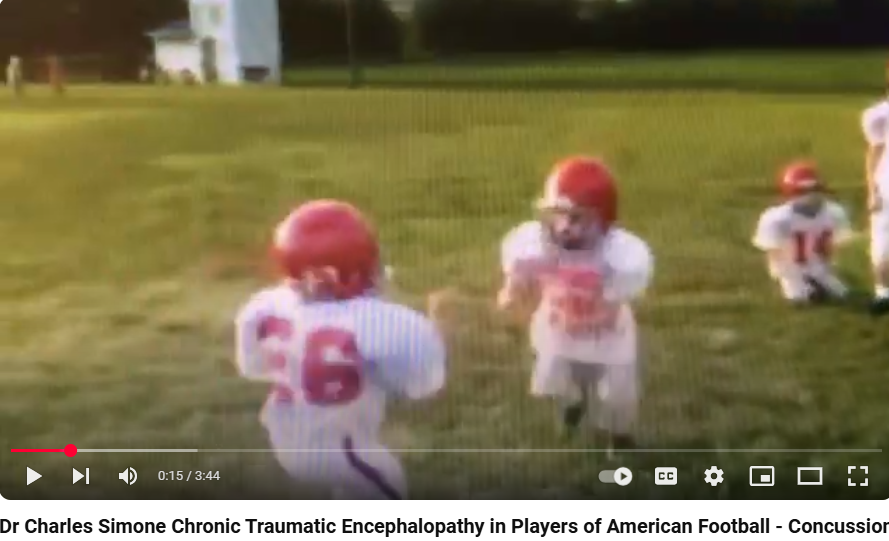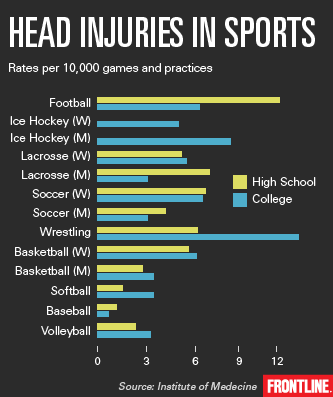Updated October 24, 2017
We do not diagnose disease or recommend a dietary supplement for the treatment of disease. You should share this information with your physician who can determine what nutrition, disease and injury treatment regimen is best for you. You can search this site or the web for topics of interest that I may have written (use Dr Simone and topic).
“We provide truthful information without emotion or influence from the medical establishment, pharmaceutical industry, national organizations, special interest groups or government agencies.” Charles B Simone, M.MS., M.D.
CHRONIC TRAUMATIC ENCEPHALOPATHY (CTE) IN PLAYERS OF AMERICAN FOOTBALL
https://bit.ly/31slm2t
Nearly one quarter of the 14 high school players in the study had Chronic Trauma Encephalopathy, indicating that permanent damage begins at an early age.
The range of mild to severe Chronic Traumatic Encephalopathy was related to the level of play – increasing from high school players to college to semiprofessional to professional players.
Average years of football participation, 15 years, including:
0 of 2 pre–high school,
3 of 14 high school (21%),
48 of 53 college (91%),
9 of 14 semiprofessional (64%),
7 of 8 Canadian Football League (88%), and
110 of 111 National Football League (99%) players.
27 had MILD Chronic Traumatic Encephalopathy pathology: 96% had behavioral or mood symptoms or both (impulse control, rage, and explosivity), 85% had cognitive symptoms, and 33% had signs of dementia. One in three had thoughts, attempts or completions of suicide.
84 had SEVERE Chronic Traumatic Encephalopathy pathology: 89% had behavioral or mood symptoms or both, 95% had cognitive symptoms, and 85% had signs of dementia.
50% also had Alzheimer’s, Parkinson’s or ALS. Alzheimer’s starts about 10 years earlier in football players.
Chronic Trauma Encephalopathy has been found in people with repetitive concussions and brain trauma: Military Veterans, Football, Hockey, Boxing, Lacrosse, Soccer, Wrestling, and Basketball. And even in those who did not play sports after high school or college. These people have memory loss, confusion, impulse control issues, aggression, depression, Parkinson’s, and dementia. And some people have no symptoms.
A Cleveland Clinic study found that college football players may experience long-term brain damage due to hits to the head even when they do not suffer a concussion because the blood-brain barrier gets disrupted and releases the astrocytic protein S100B into the blood. This causes a rise in auto-antibodies to this protein and correlates with abnormalities seen on MRI-Diffusion Tensor Imaging scans and cognitive changes. (http://journals.plos.org/plosone/article?id=10.1371/journal.pone.0056805).
Youth tackle football before age 12 – Brain trauma scientists found that those who play youth tackle football before age 12 are more likely to suffer from depression, apathy, and other behavioral issues later in life (Translational Psychiatry (2017) 7, e1236; doi:10.1038/tp.2017.197
Published online 19 September 2017).
SUPPLEMENT and PHYSICAL SUPPORT
Nutritional Hydration – SIMONE SUPER ENERGY. When a person is dehydrated, there is less spinal fluid that normally functions to keep the brain afloat and thereby separates it from the skull. So when the head is hit, the risk of contusion/concussion (black and blue) to the brain is higher with less spinal fluid.
Antioxidants and B vitamins – Simone Protector ONCCOR
Amino Acids – Simone AMINO PLUS
Anti-inflammatory: Omega 3 fatty acids EPA and DHA
Vitamin D3 – 5,000 IU per day with food
Magnesium 500 mg per day
Make sure the helmet fits properly and strengthen the neck, core and back muscles.
(c) 2017 Charles B. Simone, M.MS., M.D.
Video clips were obtained from youtube.com




